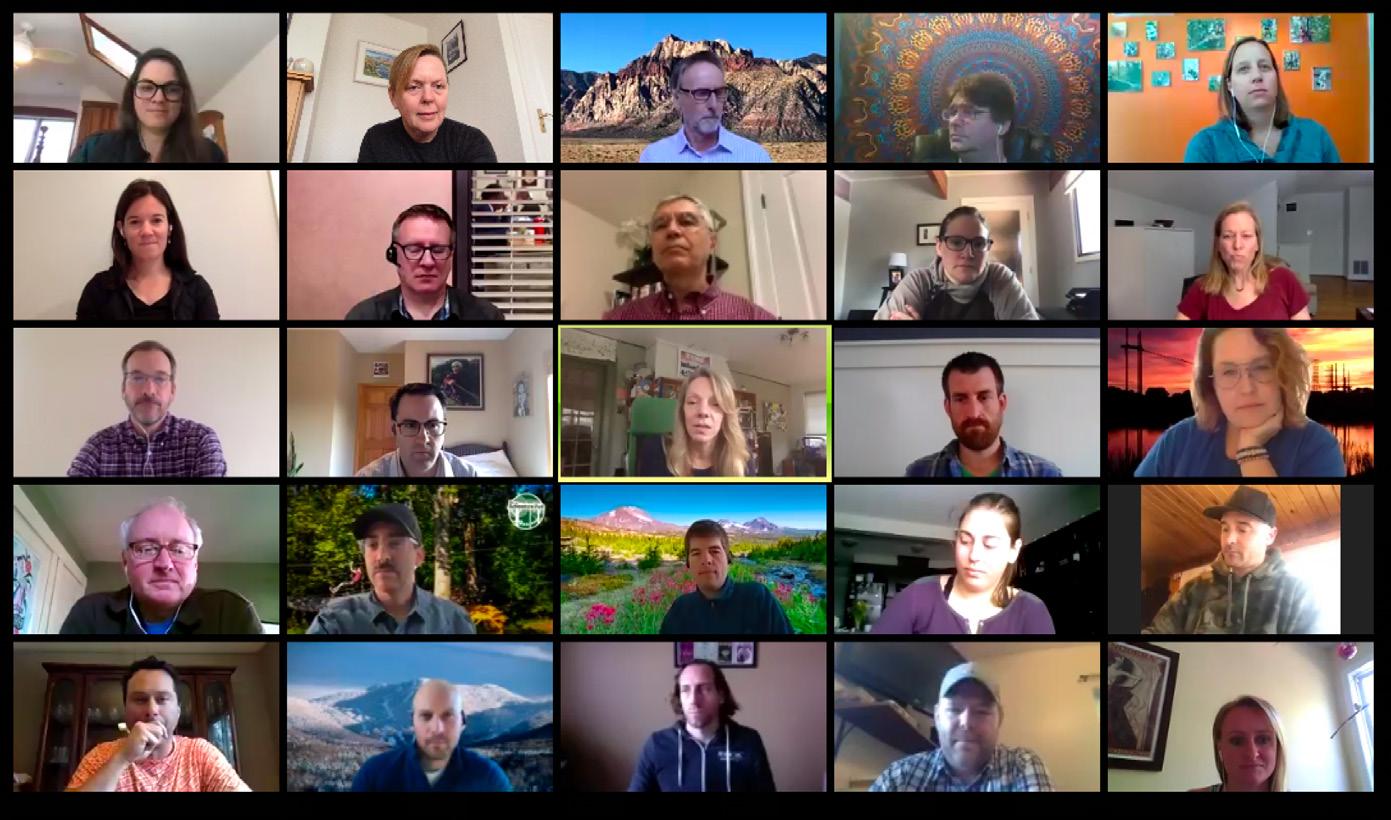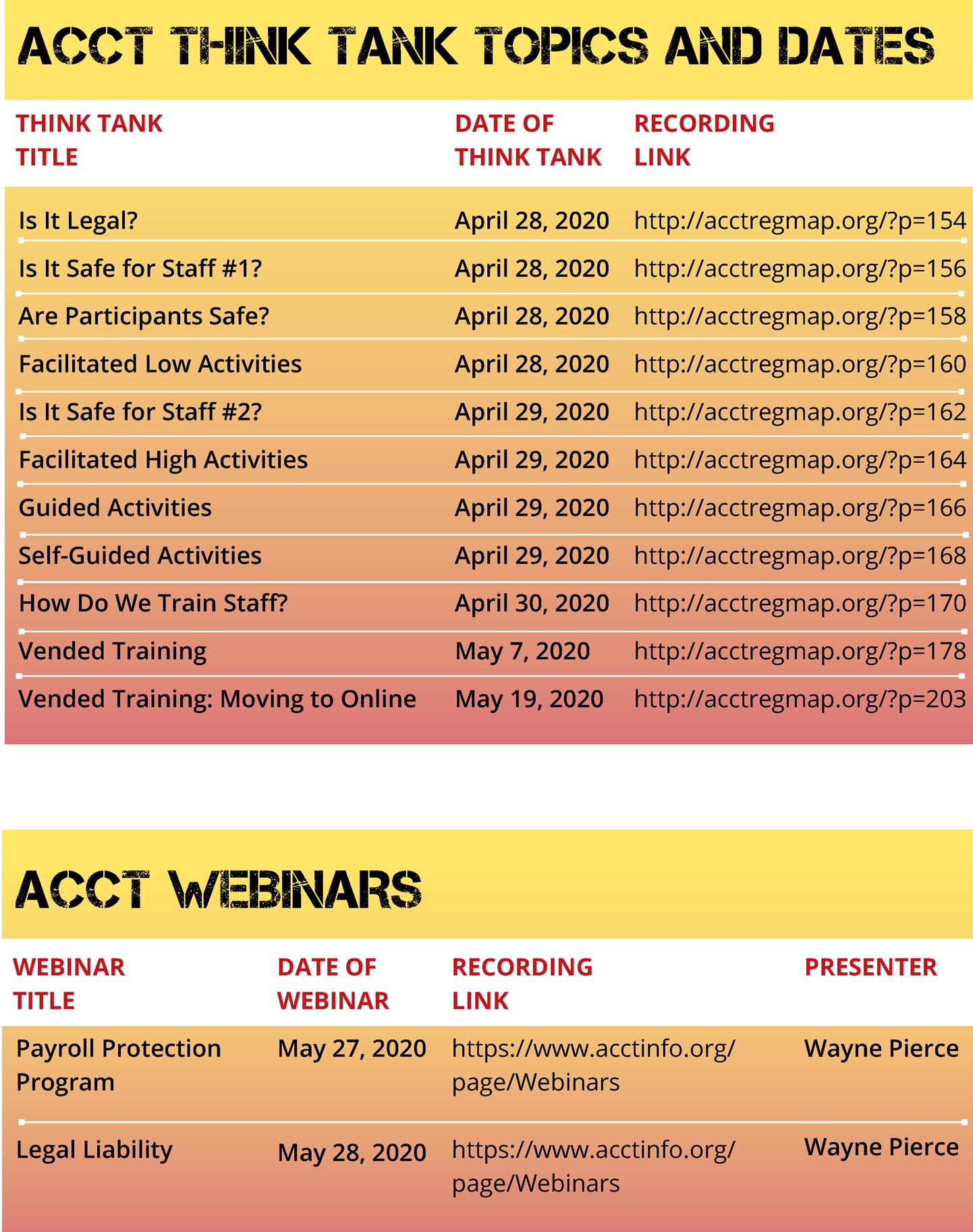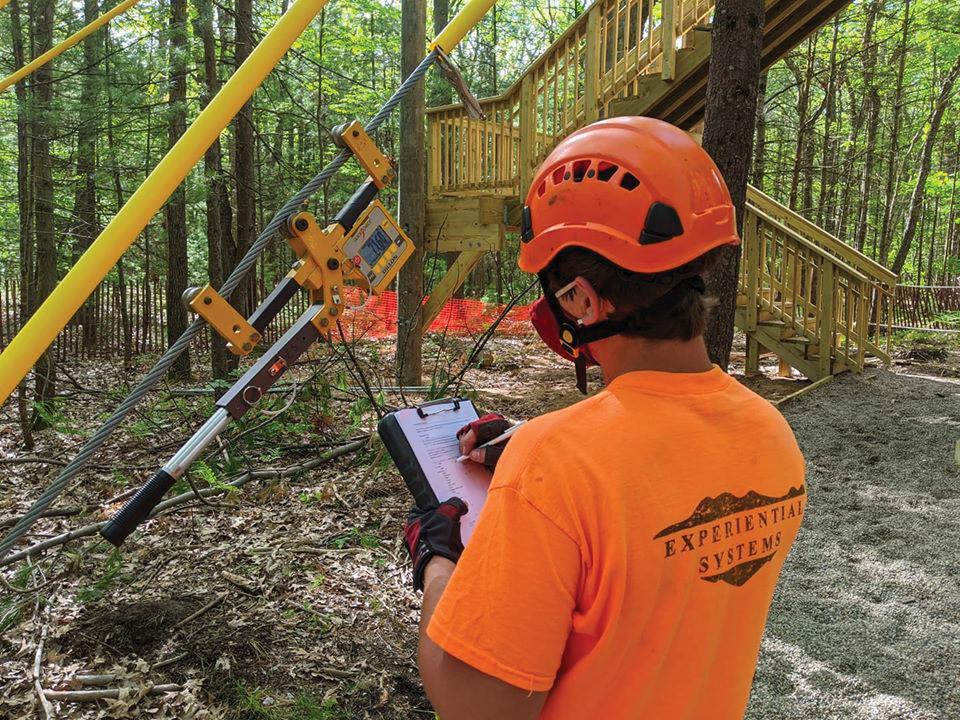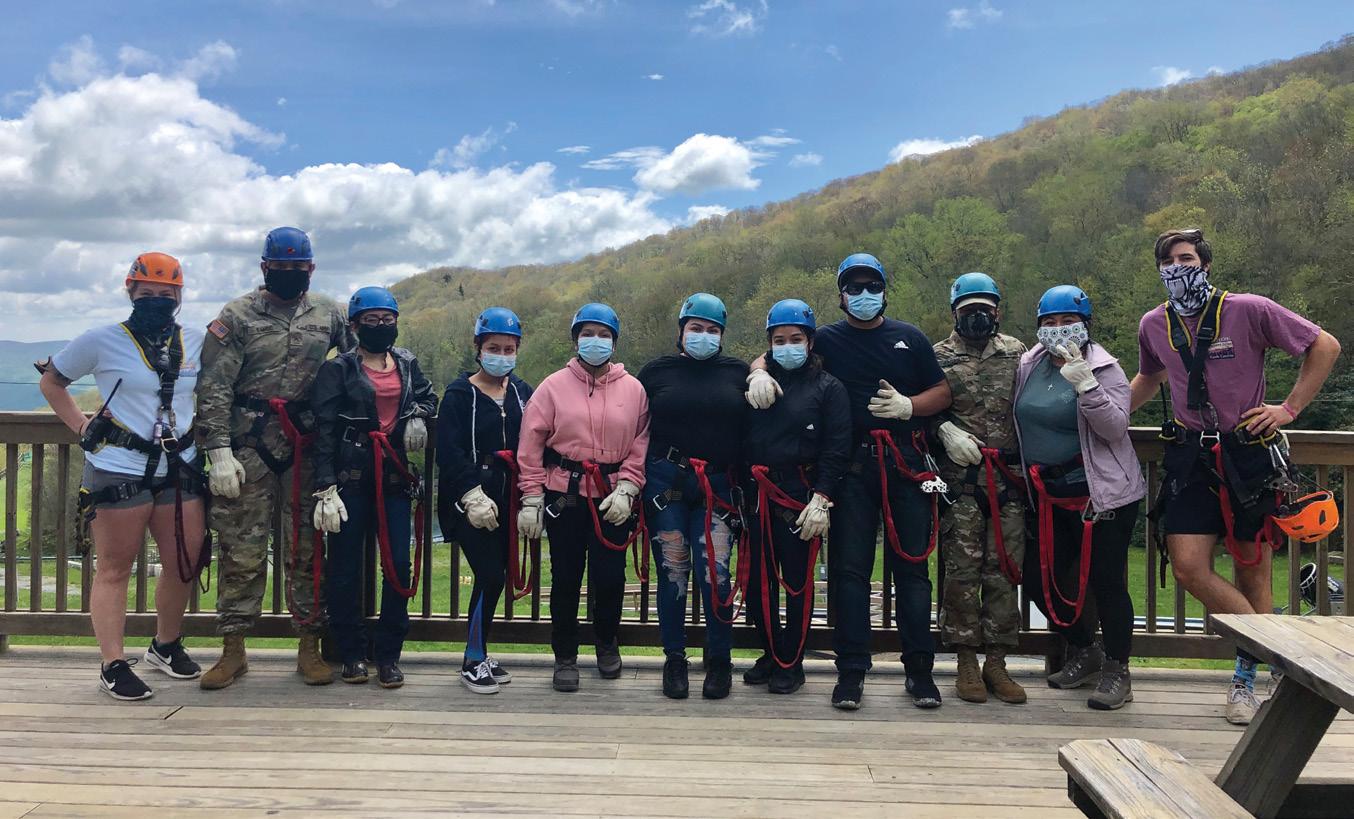
7 minute read
PARK BRIEFS
My, How Far We’ve Come
As the realities of the coronavirus pandemic began setting in during the latter half of March, there were many more questions than there were answers— but waiting around for the pandemic to end clearly wasn’t an option. So, several organizations responded by shifting focus to offer guidance and resources aimed at helping the aerial adventure industry weather the crisis.
Advertisement
Experts began weighing in to provide the aerial adventure industry with guidance about initial impacts and response, and organizations created web pages to aggregate it all. With everyone cooped up at home, though, it was a confusing, frustrating, and often overwhelming time.
In talking with operators and vendors in the industry, we at Adventure Park Insider (API) discovered there was a desire to hear what others in the aerial adventure industry were experiencing. Many were wondering how they could handle it all. Thus began the API Huddle—a facilitated online gathering of aerial adventure industry pros on Zoom.
The first Huddle was a roundtable with various experts who discussed topics such as staff, communication, finance, and operations. More than 160 people took part. The following week’s Huddle turned to a wide-ranging question-storming session that addressed “adapting to the new normal.” This in turn spawned the Association for Challenge Course Technology’s (ACCT) “Think Tank” virtual gatherings to dive into more granular discussion in an effort to produce additional guidance for the industry. Learn more about these in “It Takes a Really Big Village” on p. 7.

The first Adventure Park Insider Huddle took place April 9, 2020, and gathered more than 160 operators, experts, and suppliers to discuss the challenges presented by the COVID-19 pandemic. Panelists and the audience shared ideas and resources about topics such as staff, communication, finance, and operations.
HUDDLES, WEBINARS, AND MORE
The Huddles have continued on an almost weekly basis, covering topics such as marketing and sales, digital training, and opening in uncertain times, as well as a special Huddle with European operators who had already reopened and shared what they learned.
Other organizations and suppliers offered online educational gatherings, too: Be A Better Guide, The Alliance Collaborative, Training Wheels, and more. Productive conversations through online platforms have proven to be not only useful, but also therapeutic.
As time went by and things progressed, a flurry of useful resources and guidelines were produced by existing organizations, ad hoc groups, suppliers, and individuals from around the world to help provide clarity and direction as operators began considering next steps and, yes, reopening for business.
By mid-April, several suppliers shared guidance for properly cleaning and disinfecting equipment, specifically to kill coronavirus—a primary concern for many operators in our high-touch industry. ACCT released “Someday we will reopen,” with a general overview of what operators should consider when planning to welcome guests back. One of the first comprehensive reopening guides came from the Italian Adventure Parks Association in late April. Head Rush Technologies was one of the first suppliers to release guidance about reopening with its “Getting Started Again” resource.
Soon thereafter, the International Association for Amusement Parks and Attractions (IAAPA) published a 36-page first edition of “COVID-19 Reopening Guidance” for the global attractions industry. The Alliance Collaborative then released its own 30-page “COVID-19 Reopening & Operation Strategies for Challenge Courses & Aerial Attractions” guide.
In less than three months—from early March to late May—the global aerial adventure and attractions industry showed just how resourceful, creative, and collaborative it truly is. It’s remarkable how far we’ve come in such a short time: from the early days when safely welcoming staff and guests to our parks seemed unthinkable, to having the knowledge and guidance to offer a reasonably safe experience as parks around the world begin to reopen.
It Takes a Really Big Village
In mid-April, after the first of the coronavirus-inspired Adventure Park Insider (API) Huddles, trainer and all-around instigator Tom Leahy of Leahy Associates proposed a bold idea to us: hold a “question-storming” session that would form the beginning of an industry-wide collaboration aimed at discovering best practices across all touch points and problematic aspects of business at adventure parks and experiential programs.
It was an exciting prospect. Most folks were still relatively new to Zoom meetings. Tom was proposing that we gather as many voices and perspective as we possibly could (250, it turned out), and encourage all of them to highlight the pressing questions and issues that were concerning folks. Would the Zoom platform actually enable that sort of collaboration? Could it handle the volume of contributions? We weren’t sure it would be possible to manage the conversation and collect all the ideas, but it seemed worth the try.
The Huddle, co-hosted by Tom and API publisher Olivia Rowan, solicited thoughts from a panel that included John Hines, Wildwood Adventure Partners; Andrew Miller, Challenge Towers; Rohan Shahani, Challenge Works, Inc.; Deb Kulcsar, Experiential Learning Associates; Nick Thompson, ClimbWorks; and Kema Geroux, Tree-Rush Adventures at Fontenelle Forest. Their comments got the ball rolling. Dozens of ideas poured into the Zoom chat room. API associate editor Sarah Borodaeff collected all the questions and comments from this outpouring and organized them into several topic areas.
THINK TANKS TAKE SHAPE
At that point, it was clear that API lacked the resources and expertise to dive deeper into this material. We asked the Association for Challenge Course Technology (ACCT) if it could help, and it did.
It turns out that, as a largely volunteer organization, ACCT is quite skilled at organizing volunteer groups for just this sort of project.
Led by ACCT policy director Scott Andrews and Leahy, several groups set to work. They produced 11 Zoom “Think Tanks” regarding protocols for opening, and two webinars on specific aspects of coronavirus response: how to work the Payroll Protection Program, and legal liability. The last two, presented by attorney Wayne Pierce, did “a little bit of settling for operators,” Andrews said. “His approach, which is to focus on what operators can do to make their operations perform better, helped them relax a bit.”
The Think Tanks specifically addressed several types of operations, among them facilitated high activities, guided activities such as zip tours, and self-guided operations. Two areas of focus were addressed in multiple calls. “We went back and focused on how to keep staff safe, because of the requirements about that,” said Andrews. “That was one of the key pieces.” Three Think Tanks specifically targeted staff training. “The last two were specifically focused on vended training,” noted Andrews. “The last discussed moving training to an online format: What’s a good process for it?” That discussion was ongoing at press time.
The initial hope for the Think Tanks was that they would lead to a set of protocols that could be applied nationwide. It quickly became clear, though, that the unique rules and requirements of each state made that impossible. Instead, the Think Tanks provide a range of ideas, which helped operators figure out what procedures would best suit their local requirements.
Recordings of the Think Tanks are available on the ACCT website (see page 8 for details).

Leahy, whose idea launched the whole effort, felt the Think Tanks achieved a key goal. “We got a lot of people talking,” he said. “It was a good start. The right people were ‘in the room’ and talking about the challenges.” Leahy added that the subsequent work, from ACCT’s various actions to those of the Alliance
Collaborative, has been a “dream answered. What all the parties have done is awesome.”
NEXT STEPS
Now, as parks open and gradually increase capacity, ACCT is shifting its focus to procedures and protocols that are proving successful. “As sites begin to open and more is understood about how to open, the Think Tanks will pivot to what is working,” said Andrews. “We are tapping into the experience of people in the industry to share what they have learned and to report on the newest information on cleaning, virus transmission, and regulation.”
As the national experience with the coronavirus moves forward and aerial operations continue to evolve with it, ACCT will “work to sum up all the learnings,” Andrews said. The aim is not to catalog specific operations, but recall the lessons learned.
This is not just an academic enterprise, Andrews noted. “We may have to ask a lot of the same questions again in spring 2021, based on how the virus reacts, and if it returns. What we learn about it and dealing with it will be important to know.”

Other useful documents about operating during the pandemic are available on the ACCT Coronavirus Resources webpage.
Aerial Adventure Operators Get Back to Business

Experiential Systems performs a course inspection.
Cautiously and with restrictions, operators have resumed business. Top: Experiential Systems performs a course inspection. Right: Guests take a family photo before a zip tour at Hawksnest Zipline, N.C.

Guests take a family photo before a zip tour at Hawksnest Zipline, N.C.










